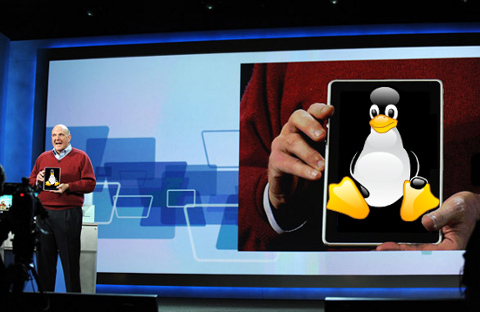
Original photo here, fair use for humour purposes
Summary: Microsoft and x86 stakeholders are falling behind mobile device kings like ARM and wonderful platforms like Linux
LINUX is currently doing to Microsoft on the tablets what it did to it on sub-notebooks in 2008 and 2009. GNU and Linux are shredding Microsoft Windows margins and leaving two monopolies out of the game. There are two Linux-based operating systems that do this at the moment (Linux is their platform). One of them is WebOS and the other is Android, which the majority of tablets seem to be running (Maemo seems to be sidling with x86 these days, under the MeeGo banner).
What does Microsoft plan to do next? Well, it will probably try the same dirty tricks it used against sub-notebooks ("netbooks™") with GNU/Linux. For those who missed it, there are posts such as:
Computex is coming and Microsoft is rumoured to be trying the same strategies with OEMs and with Intel [
1,
2,
3,
4,
5]. As some of these articles rightly state, Microsoft and Intel have sympathy for each other and they are attacking Google because it supports ARM with Linux.
Microsoft and Intel attacked OLPC when it ran GNU/Linux and AMD, so it's a familiar routine.
In reference to the image of the top, it's intended to depict the Linux-based WebOS, which beat
Vista 7. Galen Gruman wrote
the following article some days ago (also published
here under a different headline):
Why the Fate of Windows 7 'Slate' Tablet Is Sealed
The quiet disappearance of the HP Slate -- Microsoft's great tablet hope -- shows that dream has died.
The HP Slate did not disappear. It just dumped Windows and Microsoft.
Having looked at Google News yesterday, we found no headlines about "Vista" and only around 10 about "Windows 7" (surveying 7 days of news). There were also no headlines we could find with "Bing" or "Silverlight" in them because these are dying products in growth terms. So anyway,
Vista 7 is failing in tablets [
1,
2,
3] and Microsoft cannot afford to let it slide as a PR blunder. Damage control
comes from Ina Fried and
others, the party line being "Microsoft didn't need Slate anyway." It's a sour grapes classic.
Microsoft made a huge deal about Slate at the beginning of the year when Ballmer bragged about it.
Here is a photo. "HP Slate officially alive, ditching Windows 7 for Palm WebOS," says the first among the following bunch of articles (we covered the confirmation of rumours last week).
This whole development gives an example for other tablets makers, insinuating by example that they have nothing to look for in Windows because HP rejected it for tablets. Linux is becoming abundant, Windows is becoming redundant.
⬆

